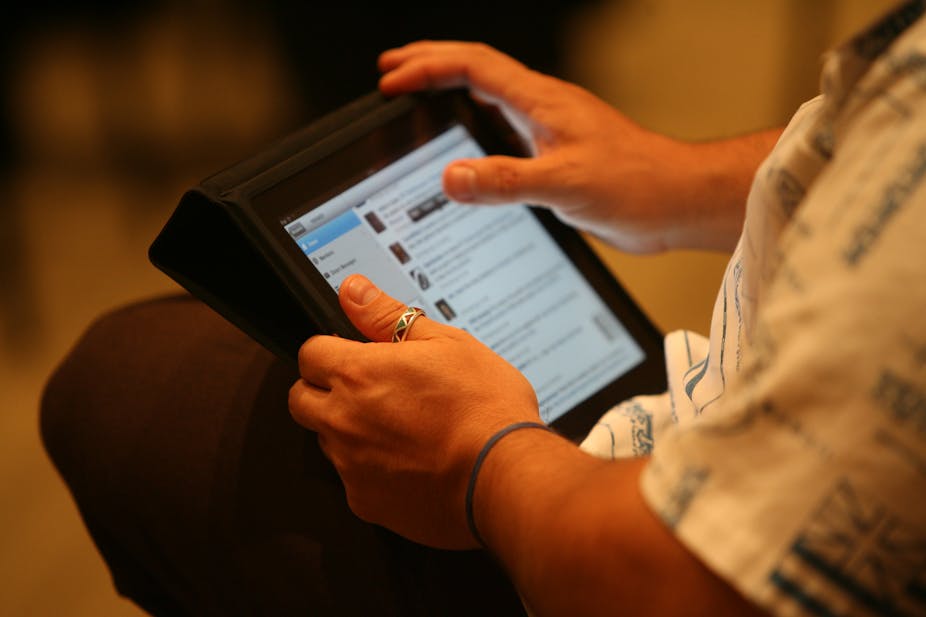As the hype around the internet of things grows, we are being presented with dystopian images of a future in which our fridges spy on us and our toothbrushes tattle to our dentists and insurers. But our concern about these extreme examples is distracting us from a more pressing issue – the collision between social media and financial services.
Here, old and new, privacy and sociability, corporate control and open-source sharing are producing a tangled, complicated, often contradictory mess –- and along with it, the future we’ll probably get.
When is social media like pot?
People who grew up in Nancy Reagan’s “just say no” 1980s endured a lot of propaganda about drugs, one of which was the myth of the gateway drug. We were told drugs such as marijuana were highly dangerous because they led users towards harder drugs, even if they themselves had few medically proven consequences.
In a recent article for the Financial Times, Evgeny Morozov presented a view of social media that makes it look like a gateway drug, a freebie that financial organisations exploit to hook us on products and services. It’s only later we realise the control they have over our lives.
He argues that soon the inside of our mouths, fridges, rubbish bins, and cars will be networked and reporting on us to anyone willing to buy the data. That data will be bought by third parties and used to adjudicate our employability, our romantic fitness and even our credit worthiness. If gum buyers are 5% more likely to default on their auto loans than chocolate buyers, you may find yourself still driving that clapped-out banger, regardless of your own ability to pay.
For Morozov, the situation is neoliberal capitalism galvanised by ubiquitously networked “stuff”.
Financialisation of this kind involves the creeping introduction of bottom-line thinking into what used to be private places. We do our banking online while we’re at home or we invest in stock as a hobby. Other forms of money management which were once classed as “work” are now billed as necessary parts of being a financially responsible adult. That includes having a stocks and shares ISA or even just knowing about the best pension. In Morozov’s vision, we’ll be spending all our time gaming our data output, to look as appealing as possible to the corporations controlling what we’re offered and how much they’ll charge, on the go, in real time.
New finance
As cultural anthropologists we talked to managers at companies who are trying to combine big data with lending, as well as the customers who are turning to them as alternatives to old-school consumerist products and services.
We found them using advanced data analytics in their work but they were doing it to tackle a very traditional problem. Zopa Limited, for example, is the sort of financial innovator Morozov has in mind when he speaks of Silicon Valley’s ability to “disrupt” Wall Street with “better data and better engineers”. Zopa is a peer-to-peer lender – an intermediary firm which uses a proprietary algorithm to evaluate credit risk and then matches individual borrowers of relatively small sums to potential investors with a bit of spare cash.
Zopa claims its algorithm weeds out bad credit risks better than the high street banks, enabling the firm to offer better rates to borrowers and lenders.
Zopa is applying the Silicon Valley notion that any problem can be solved with software and marketing to what was once a UK high street banking monopoly –- short to medium-term unsecured consumer lending and borrowing. Only one top executive is from the financial industry –- its risk analyst. The rest are serial entrepreneurs, marketers, and number crunchers. Banking is now a software practice and banks are now, slowly, becoming technology companies.
But even though Zopa is technological in its approach, it isn’t harnessing the power of evil toothbrushes or fleets of drones.
Zopa tackles the more traditional issues of trust and risk when trying to win custom. Big banks have always used social signals such as neoclassical architecture and three-piece suits to convey messages of high trust and low risk. Zopa, being bricks-and-mortar-free, has to use creative marketing and design to look like a company you can trust with your money and not a bunch of wacky kids with a website.
And it all works because people are more and more comfortable online. Most of us have embraced online life in one form or another, particularly in our social lives. In this way, social media really is a gateway drug from something we thought was just for kicks, like chatting with friends and family, to an activity that really is a gamble – opening every facet of our lives up for financial manipulation.
It is in these everyday, slightly dowdy design choices that social financialisation is being built. In trying to make up for a lack of bricks and mortar, these new financial players are producing social-media-like services that could lead us further towards Morozov’s vision of trying to level up our gamified toothbrushes to lower our dental insurance premiums.
We need the cautionary tales of the dystopias we’re building and the utopian visions of data power to the people. But more, we need to know if our gateway drugs of free apps and social data sharing really are harmless hits and performance enhancements or whether they will lead to a bad trip. One thing we suspect is true: we can’t “just say no.”

